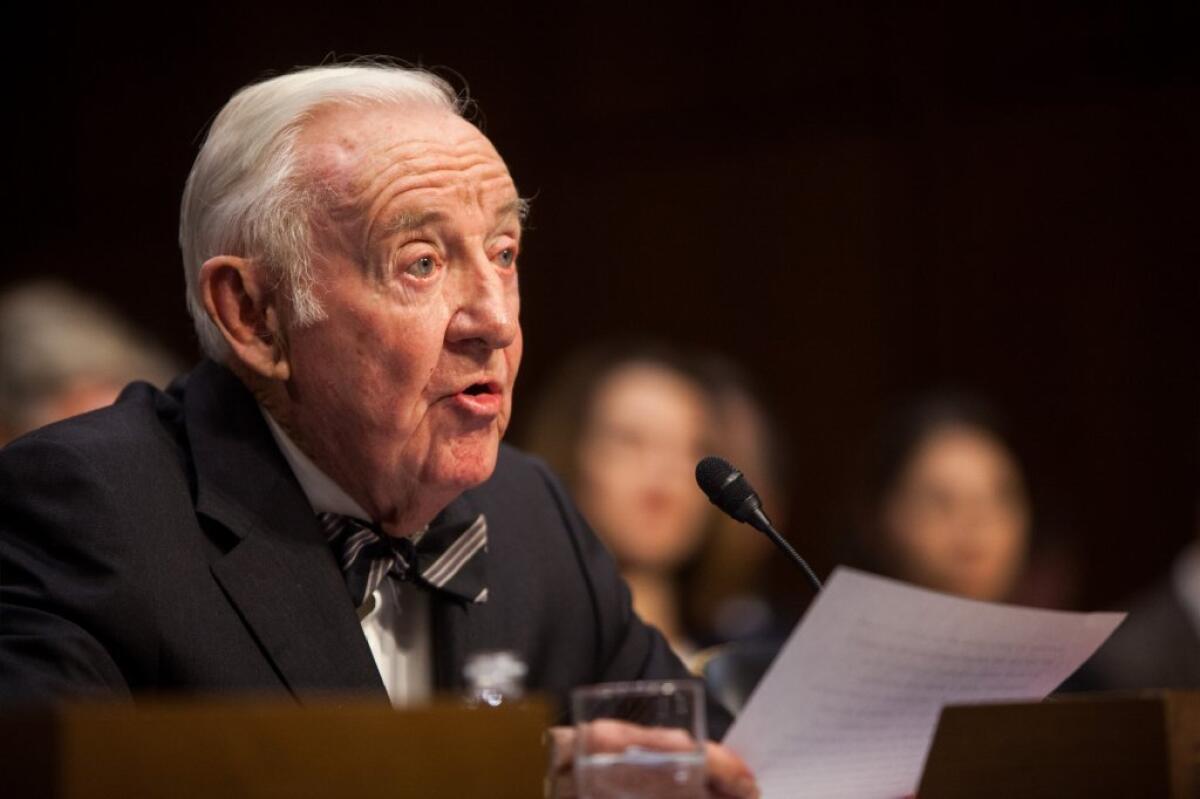Opinion: Would Justice Stevens allow ‘reasonable’ limits on a free press?

Retired Supreme Court Justice John Paul Stevens, one of the most active nonagenarians in American public life, is being widely praised for his testimony this week before a congressional committee. To the delight of critics of Citizens United, Stevens told the Senate Rules committee that the Constitution should be amended as follows:
“Neither the 1st Amendment nor any provision of this Constitution shall be construed to prohibit the Congress or any state from imposing reasonable limits on the amount of money that candidates for public office, or their supporters, may spend in election campaigns.”
This would overrule not just the Citizens United decision, which held that unions and corporations have a 1st Amendment right to spend funds on independent political expression, but a major holding of the 1976 Buckley vs. Valeo decision providing similar protection for political expenditures by wealthy individuals.
In that decision, the court rejected the idea that Congress could “level the playing field” by putting limits on how much individuals could spend to express their opinions in elections. The court said that “the concept that government may restrict the speech of some elements of our society in order to enhance the relative voice of others is wholly foreign to the 1st Amendment.”
But apparently not to Stevens, who told the committee: “Elections are contests between rival candidates for public office. Like rules that govern athletic contests or adversary litigation, those rules should create a level playing field.”
The problem with that analogy is that candidates aren’t the only ones speaking during an election campaign. So are private citizens — including, yes, wealthy ones — and newspaper editorial writers. On Thursday, for example, the Los Angeles Times endorsed Matt Miller for a seat in the U.S. House. Even if a quarter of the newspaper’s 1.4 million readers saw the editorial, that is an amazing amplification of the “vote for Miller” message. But getting that message out costs money.
So should The Times and other newspapers worry about Stevens’ proposed constitutional amendment? The good justice thinks we should relax, and he points to the word “reasonable” in his proposed text. He told the committee: “I think it wise to include the word ‘reasonable’ to ensure that legislatures do not prescribe limits that ... interfere with the freedom of the press.”
The problem is that a legislator’s idea of a reasonable restriction on the media might be viewed differently by journalists. That was the case with a Florida law struck down by the Supreme Court in 1974, which required a newspaper that had criticized a political candidate to publish the candidate’s reply “in as conspicuous a place and in the same kind of type as the charges which prompted the reply.”
If Stevens’ proposed amendment were adopted, legislators might deem it equally reasonable to prevent newspapers from publishing more than 10,000 copies of an editorial endorsing a candidate for public office. They could call it the Level the Playing Field Law or maybe the Undue Editorial Influence Act. And the 1st Amendment wouldn’t stand in the way.
Ironically, Stevens’ testimony has spawned a side controversy over whether he himself was engaging in prohibited political speech. Although retired from the Supreme Court, he remains a life-tenured federal judge who can be called on to sit on lower courts. A debate has been brewing on legal blogs about whether Stevens’ testimony violated an ethical stricture against judges appearing at public hearings or consulting with legislators. (There is an exception for situations in which “a judge’s judicial experience provides special expertise in the area at issue.”)
A final oddity: Even though Stevens retired from active service as a Supreme Court justice, the text of his congressional testimony can be found … on the Supreme Court website!
ALSO:
Without U.S. troops, Afghanistan, like Iraq, could descend into chaos
Supreme Court dilemma: Is a smartphone a home away from home?
GOP senator has world’s lamest excuse for blocking minimum-wage hike
More to Read
A cure for the common opinion
Get thought-provoking perspectives with our weekly newsletter.
You may occasionally receive promotional content from the Los Angeles Times.







